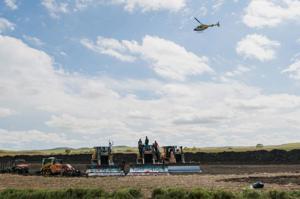Dakota Access pipeline hangs over White House tribal summit
(Reuters) President Barack Obama will convene his eighth and final Tribal Nations Conference on Monday and Tuesday, assembling leaders of more than 560 Native American tribes to discuss the environment and a range of other issues, even as one of the largest Native American protests in decades continues in North Dakota.
Thousands of Native Americans, along with environmentalists, are encamped on the North Dakota prairie to demonstrate against a $3.7 billion oil pipeline they say threatens the water supply and sacred sites of the Standing Rock Sioux.
Tribal leaders will be eager to hear at the conference from Obama. It was not clear if he would directly address the 1,100-mile Dakota Access pipeline, being developed by Energy Transfer Partners LP. He is scheduled to speak at the conference near the White House on Monday afternoon.
He has not publicly commented on the pipeline since the Justice Department, Interior Department and the U.S. Army made a surprise move on Sept. 9 to temporarily block construction of the pipeline. At that time, the administration called for "a serious discussion" about how the tribes are consulted by the government in decisions on major infrastructure projects.
The uproar over the Dakota Access pipeline has sparked a resurgence in Native American activism.
After the conference, the Army, Interior and Justice will hold a listening session on the shortcomings of the present consultation process on Oct. 11 and formal tribal discussions in six regions of the country from Oct. 25 through Nov. 21.
The deadline for written input will be Nov. 30, the agencies announced.
On Thursday, Standing Rock Sioux Tribe Chairman Dave Archambault told a Democratic House of Representatives panel there was no "meaningful consultation" before permits were issued to bring the pipeline through his tribe's territory.
Archambault is scheduled to speak on Monday evening after the conference at a rally of pipeline opponents.
Obama, who will leave office in January, before he goes likely wants to alter the consultation system and improve relations between the federal government and Native Americans.
"This year's conference will continue to build upon the president's commitment to strengthen the government-to-government relationship with Indian Country and to improve the lives of American Indians and Alaska Natives," said a White House advisory on the summit.
Interior Secretary Sally Jewell, who chairs the White House Council on Native American Affairs, will also participate in tribal-led discussions on environment, infrastructure, economic development, health care and education.
Reporting by Valerie Volcovici; Editing by Kevin Drawbaugh and Matthew Lewis







Comments